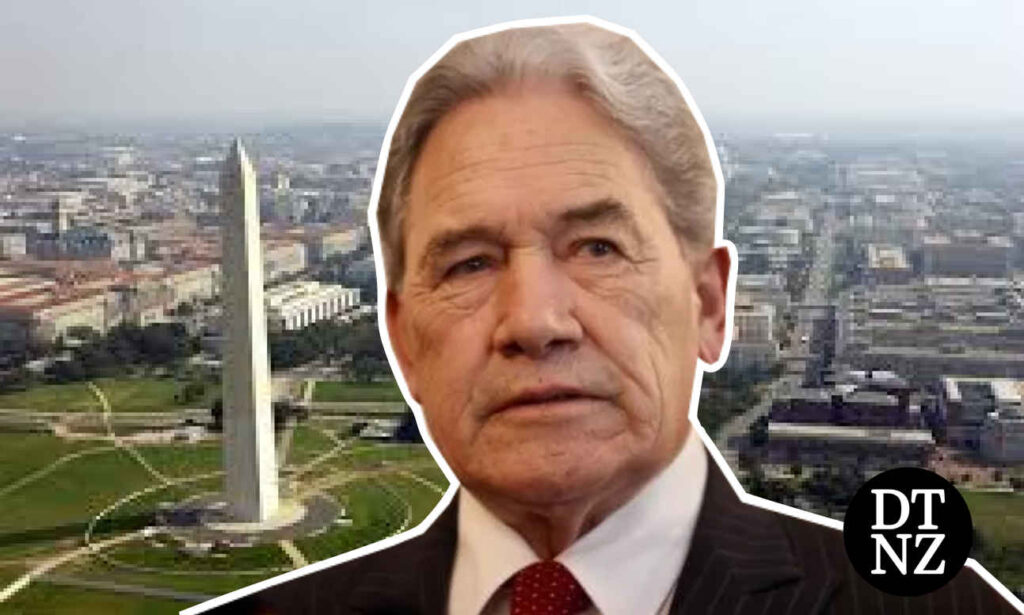This could be a watershed week for New Zealand’s international relations.
Winston Peters, the foreign minister, is heading to Washington DC for a full week of meetings.
The surprisingly lengthy trip just happens to coincide with a major trilateral summit of leaders from the United States, Japan and the Philippines.
And a media report at the weekend suggested a wider Aukus ‘Pillar II’ announcement is imminent. The original Aukus partners are Australia, the United Kingdom and the United States.
Rahm Emanuel, the US Ambassador to Japan, wrote late last week that Japan was ‘about to become the first additional Pillar II partner’.
In recent weeks, policymakers have been keen to downplay New Zealand’s immediate Aukus membership prospects. Judith Collins, New Zealand’s defence minister, said there was ‘no guarantee’ that New Zealand would join the arrangement, while US Under Secretary for Arms Control and International Security Bonnie Jenkins was similarly non-committal during a visit to Wellington in March.
That said, diplomatic smoke signals suggest something is afoot: on top of Jenkins’ visit, Collins recently had a phone call with US Secretary of Defence Lloyd Austin, while US Deputy Secretary of State Kurt Campbell spoke to officials at New Zealand’s Ministry of Foreign Affairs and Trade.
The Aukus debate is incredibly important. But it is worth keeping it in perspective.
A reshaping of New Zealand’s foreign policy is also coming slowly but surely in other ways.
On the first leg of his now five-country trip, Peters confirmed that New Zealand is finalising an ‘Individually Tailored Partnership Programme’ (ITPP) with the North Atlantic Treaty Organization (Nato).
The ITPP plans were first revealed nearly a year ago by New Zealand’s then Labour foreign minister, Nanaia Mahuta. But while Chris Hipkins, then Prime Minister, attended July’s Nato summit in Lithuania, the ITPP largely disappeared from view.
This contrasted with Australia, Japan and South Korea, which all agreed new partnerships with the West’s premier political and military alliance.
Based on Peters’ reference to the ‘coming months’, it now seems a near-certainty that New Zealand’s ITPP will be finalised in time for Christopher Luxon to attend this year’s Nato leaders’ meeting in Washington DC in July.
The decision to use the ITPP agreement structure – as opposed to institutionalising the ‘Indo-Pacific 4’ (or IP4) nomenclature that is sometimes used to refer to the group informally – may have been at least partly motivated by New Zealand’s sensitivities over China.
Nato’s inclusion of China as a ‘systemic challenge’ in its long-term ‘Strategic Concept’, released in 2022, was a major reason why the alliance sought to revitalise its partnerships with countries situated well beyond the North Atlantic.
China’s response to New Zealand’s finalised ITPP will be intriguing. Last year, Wang Xiaolong, China’s ambassador in Wellington, issued a lengthy statement after Hipkins attended Nato’s gathering in Vilnius. Wang closed by warning New Zealand to ‘refrain from opening the door to the devil’.
In addition to Aukus and Nato, it is worth recalling New Zealand’s involvement in other groupings that have recently either emerged or reemerged. These include the Indo-Pacific Economic Framework (IPEF) and Partners in the Blue Pacific (PBP) groupings – but also the Five Eyes and the Anzus Treaty.
New Zealand was a founding member of both the IPEF and PBP groupings that were launched in the first half of 2022. The arrangements came in the febrile aftermath of Russia’s invasion of Ukraine and subsequent revelations of a security agreement between China and Solomon Islands.
The IPEF includes 14 countries from around the Indo-Pacific, but notably excludes China. Meanwhile, the PBP includes Australia, New Zealand, the United Kingdom and United States as members, with Canada, Germany and South Korea involved as ‘partners’.
Both arrangements are modest on the surface, but hold significant potential. The ‘IPEF Supply Chain Agreement’ that came into force in February 2024, for example, is clearly a starting point for reducing overall economic dependence on China – especially in strategic areas. The agreement suggests a particular focus on ‘sectors and goods critical to national security, public health and safety’. The details are still to be worked out by an ‘IPEF Supply Chain Council’.
Like the IPEF, the PBP is another practical way for the West to counter Chinese influence. The PBP is particularly useful for expressing commitment to previously-neglected Pacific countries. A joint statement issued after a PBP foreign minister meeting in September 2023 mainly focused on providing support to Pacific countries on issues such as illegal fishing and climate change. However, it also emphasised cybersecurity and pledged support for a new Pacific Cyber Capacity and Coordination Conference.
Meanwhile, the ‘Five Eyes’ grouping of the five English-speaking countries of Australia, Canada, New Zealand, the UK and US continues to rise in prominence – both formally and informally. The arrangement is probably at its strongest when focusing on intelligence sharing, its original purpose, as seen in the recent spying allegations that were made against China.
But informally, the Five Eyes label also refers to increased cooperation amongst the five trusted Anglosphere members in other areas. This cooperation does not always involve the United States. Sometimes the smaller Five Eyes partners have worked together and put pressure on Washington and London. For example, the Prime Ministers of Australia, Canada and New Zealand issued joint statements calling for a ceasefire in Gaza in December 2023 and February 2024.
Finally, there is the question of Anzus, an alliance between Australia, New Zealand and the United States established in 1951. This was effectively Australasia’s equivalent to Nato. In theory, it would be an ideal ‘minilateral’, a format currently favoured by Washington (as seen in this week’s US-Japan-Philippines tripartite summit). A recent joint statement from Australian and New Zealand defence ministers referred to the ‘enduring nature of the Anzus Treaty’ – which caught the attention of former New Zealand Prime Minister Helen Clark.
Why did #ANZUS Treaty suddenly pop up in NZ-Australia ministerial communique when the Closer Defence Relationship between the 2 countries is more usually cited as the current basis for the relationship? Audrey Young explores the issues in @nzherald https://t.co/TgBmPCeSFl
— Helen Clark (@HelenClarkNZ) March 31, 2024
There is just one problem: the United States officially suspended its obligations to New Zealand in 1986, after the then Fourth Labour Government (in which Clark was a minister) adopted a nuclear-free policy. While a centre-right National-led coalition is now in power in Wellington, the nuclear-free policy remains popular. Touching it would almost certainly be a non-starter for Prime Minister Christopher Luxon, a keen centrist.
Unless some form of workable compromise could be found, the only real solution left would be for the US to accept New Zealand’s nuclear-free policy as the price of welcoming New Zealand back into the Anzus fold. If Anzus were fully restored, it would once again confer US ally status on New Zealand. It would be the most radical foreign policy shift yet for Wellington – but also a clear win.
But like the other options – whether Aukus, a Nato partnership agreement, the Indo-Pacific Economic Framework, Partners in the Blue Pacific – an improbable Anzus revival would still suffer from a major flaw.
The more hawkish Wellington becomes, the greater the risk of reprisals from Beijing.
None of the options would give New Zealand the elusive free trade agreement with the United States – or comprehensive market access elsewhere – that would offer New Zealand any kind of realistic trading alternative to China.
China has had a free trade agreement with New Zealand since 2008 – and is happy to buy virtually anything New Zealand produces.
The United States is not. It still buys 13 per cent of New Zealand’s exports – but China takes 28 per cent.
In the end, it all comes down to the numbers.
Geoffrey Miller is the Democracy Project’s geopolitical analyst and writes on current New Zealand foreign policy and related geopolitical issues. He has lived in Germany and the Middle East and is a learner of Arabic and Russian. He is currently working on a PhD at the University of Otago on New Zealand’s relations with the Gulf states.


NATO is impoverishing Europe demanding continual funding for its Ukrainian proxy war against Russia. America falls apart while billions of dollars are sent to fund wars in Ukraine and Gaza. Now America wants to confront China (our major trading partner) with an Asia-Pacific NATO and to do this will steal the wealth and blood of Japan, the Philippines, South Korea, Australia – and New Zealand because we don’t have a choice. It will have the appearance of a grand alliance of the “democracies” against China, at a time when, as we all well know, democracy no longer exists in this country. It has been replaced by a political and bureaucratic class obedient to foreign oligarchs who would rather set the world on fire than have a global peace where they do not rule.
And these incompetents want us to buy a ticket on the Titanic. Why people vote mainstream is beyond me.
Getting into bed with the devil. NATO ruins anything it touches and has been a menace on the world stage for years.What they did in Yugoslavia was unforgivable and detestable.
I’m starting to despise this so called govt as much as the last one. I really wish people would stop voting for these loathsome globalist party’s.
This is why New Zealand needs to declare itself as a ‘Neutral Nation’ and configure / prep the populations, the economy and international trade to abide by the same!
While other nations rage in waging war, New Zealand will wage business in foreign Free Trade.
But…don’t expect the politicians in N.Z. to understand that.
I wonder how much monetary growth the current N.Z. Cabinet has gained under Luxon, as compared to Jab-Sin-Da…and how much of that is gifted items / assets based offshore???